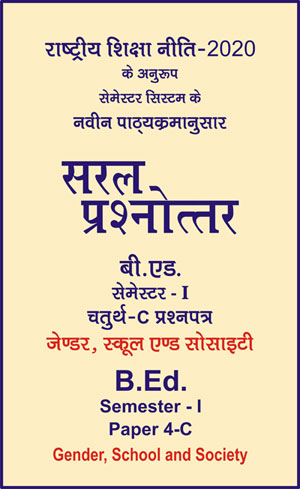|
बी एड - एम एड >> बी.एड. सेमेस्टर-1 प्रश्नपत्र-IV-C - जेण्डर, स्कूल एण्ड सोसाइटी बी.एड. सेमेस्टर-1 प्रश्नपत्र-IV-C - जेण्डर, स्कूल एण्ड सोसाइटीसरल प्रश्नोत्तर समूह
|
5 पाठक हैं |
||||||
बी.एड. सेमेस्टर-1 प्रश्नपत्र-IV-C - जेण्डर, स्कूल एण्ड सोसाइटी (अंग्रेजी भाषाा में)
Question- Explain the meaning and concept of conservatism.
Related Short Answer Questions
- What is the meaning of orthodox?
- What are the factors responsible for stereotyping?
Answer -
The principle of conservatism is based on traditional institutions and practices. The French thinker Shatobayand is believed to have coined the term in 1818 as he named his journal L’Conservatore. However, conservative ideas and theories began to appear in the late 18th and early 19th centuries in reaction against the increasing pace of economic and political change, which was mainly fueled by the French Revolution. Conservatism as a concept place more importance on what is historically inherited rather than ideal and historical. Conservatives believe in an organic view of society, meaning that society is not a loose collection of individuals, but rather a living entity consisting of closely related interdependent members. Conservatives also argue that the government is a servant in the sense that it should advance existing ways of life and that the political class should not attempt to replace them. An important difference between a conservative and a reactionary approach is that as a reactionary, one favours the restoration of a previous political and social order, which has become obsolete. Conservatism tries to preserve tradition and, in a way, it seeks to preserve what one has to get something that no one else has. Edmund Burke said, “We must see ourselves not only in the partnership between those who are alive, but also among those who are living, those who are dead and those who are to be born.” Another prominent Conservative theorist Michael Oakeshott said that being a conservative means “to know the unknown, the reality from the possible, the limited to the limitless, the near to the far, the right to the very right” as conservatives believe. That humans are imperfect and combined with the unpredictable consequences of an action, it becomes difficult to assess whether a change will be for the better or otherwise. Therefore, they try to resist change in the current sequence. Resist change until the inevitable. Burke believed that for protection one must change, but the pace of this change should be gradual, not revolutionary. In his seminal work on Change in the Revolution in France (1790), Burke gave a contradictory narrative, saying that the revolution’s violent, immorally overthrown methods outweighed its liberating ideals. That is why he defended the traditional aristocracy of the pre-revolutionary days for stability and prosperity rather than post-revolutionary uncertainty. For him, there is complexity in the working of modern nation states and attempts to reform them on the basis of metaphysical principles can lead to autocracy. Conservatism is opposed to liberalism and socialism, as these ideologies try to free a person from traditions, but a conservative does not want such liberation. In its efforts to resist the pressures created by the rise of liberalism, socialism and nationalism, conservatism stands to defend the traditional social order. Proponents of conservatism also believe that inequalities of wealth and status are inevitable and there is no point in discussing their elimination. Some of the factors responsible for conservatism are:
- Need for power, authority and social hierarchy.
- Respect for tradition.
- Religion’s emphasis on natural law.
- Emphasis on the organic nature of society.
- Free market and limited government.
According to Russell Kirk, there are six doctrines of conservatism:
- A divine intent governs society as well as conscience— “Political problems are, at the bottom, religious and moral problems.”
- Traditional life is full of diversity and mystery, while most radical systems are characterized by a narrow homogeneity.
- Civilized society requires orders and classes: “The only true equality is moral equality.”
- Property and liberty are inseparably linked.
- Man must control his will and his appetite, knowing that he is governed more by reason.”
- “Change and improvement are not the same” - Security must be changed gradually.
|
|||||













